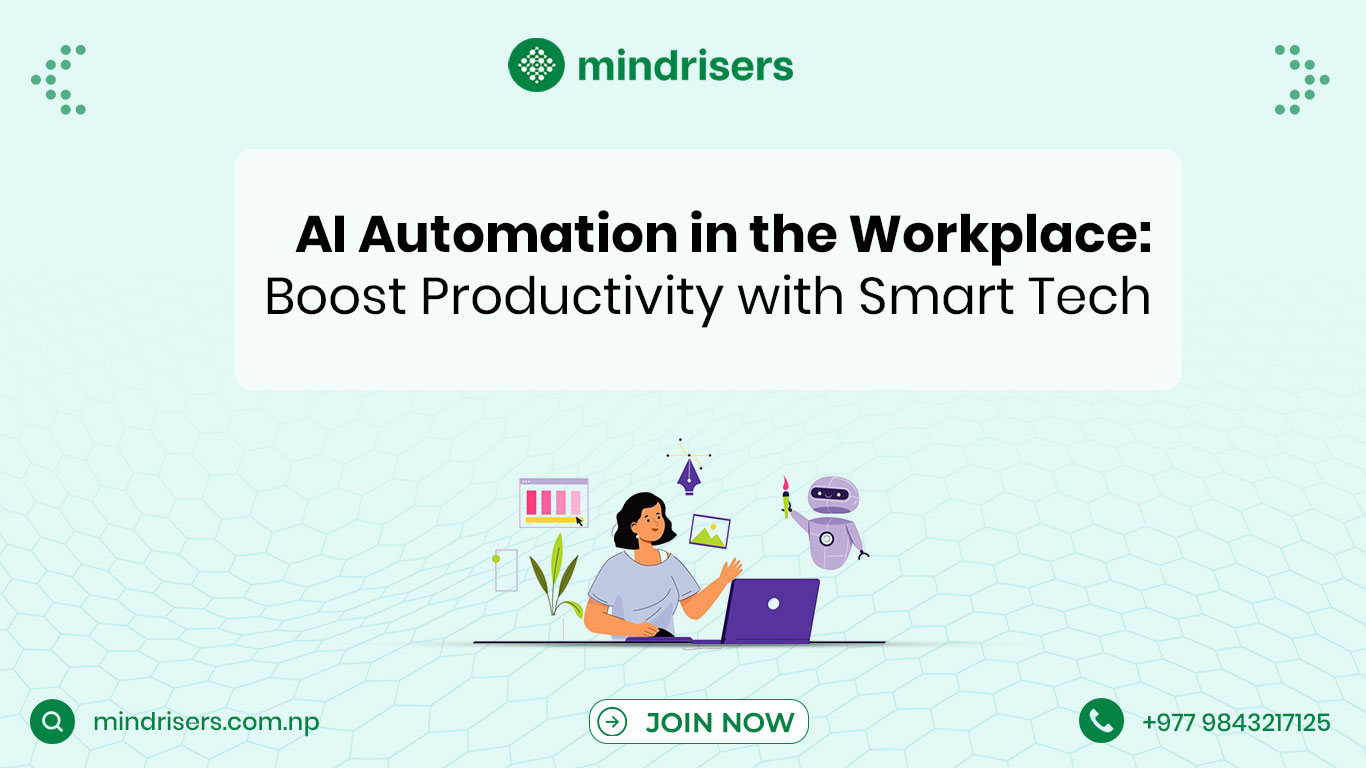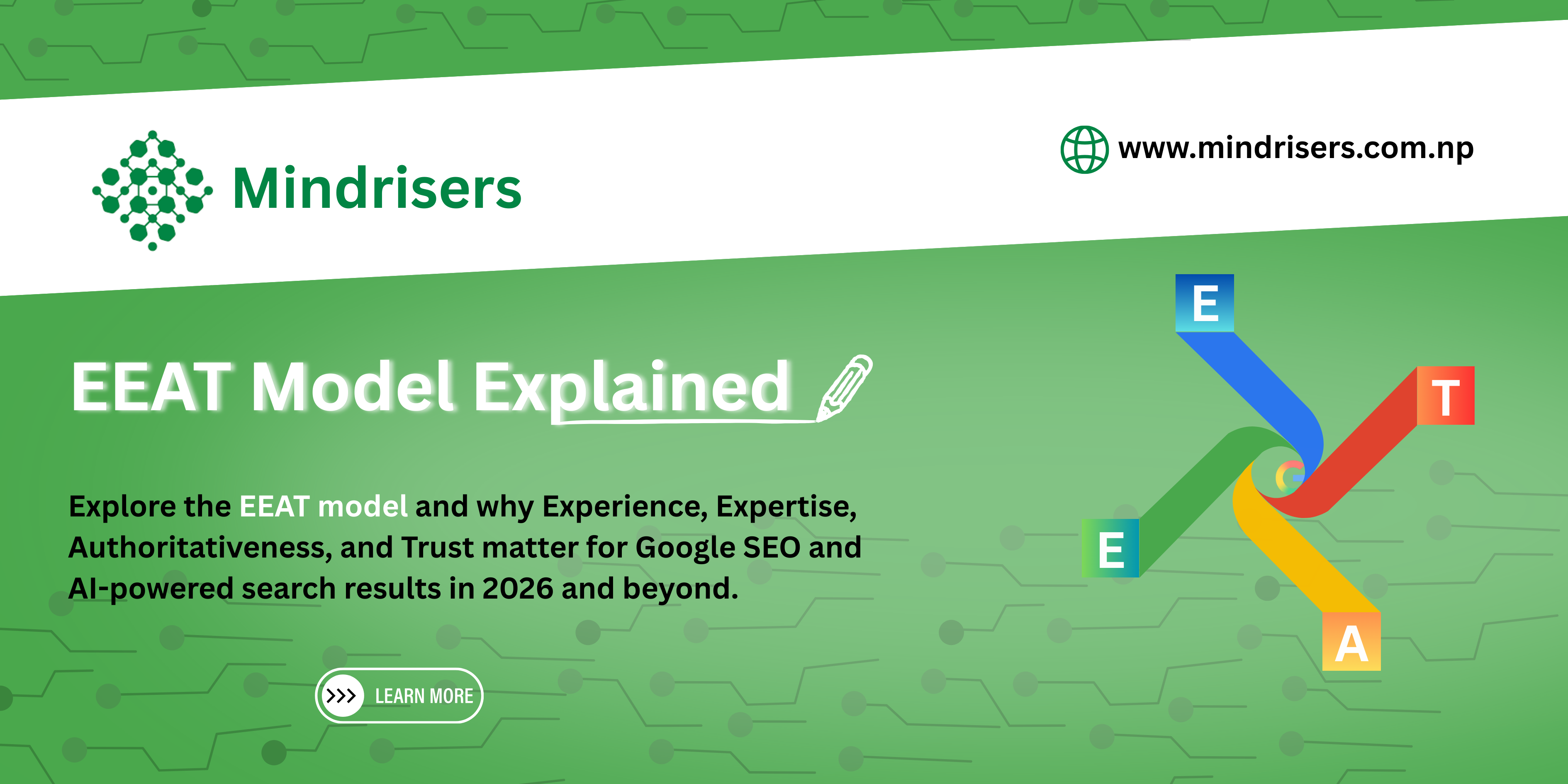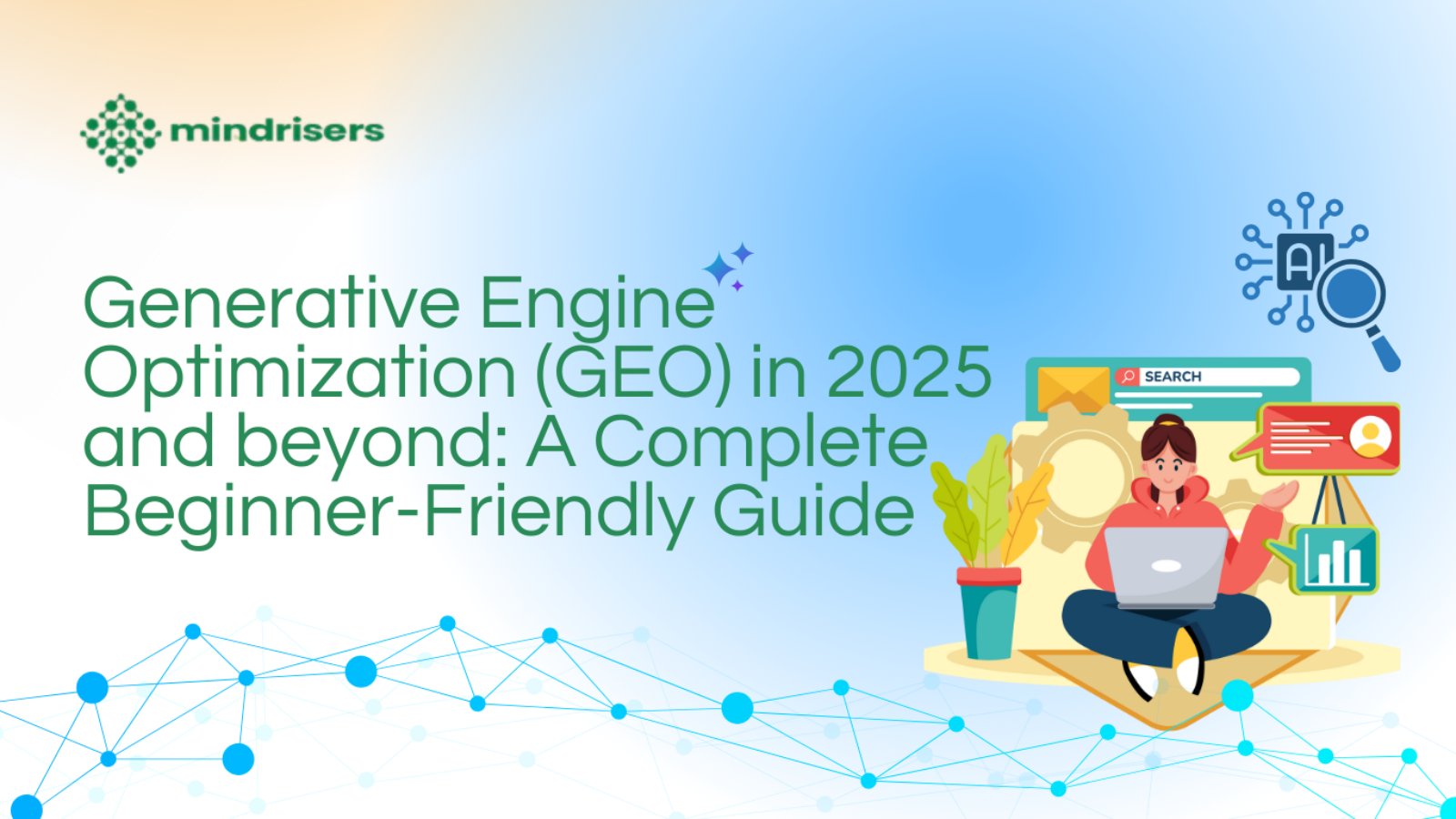
Sunil Basnet - Author
2025-07-21
In today's rapidly evolving digital landscape, the power of artificial intelligence (AI) is transforming the way businesses operate. AI automation in the workplace is among the most revolutionary uses. From streamlining operations to enhancing employee and customer experiences, AI-powered automation is redefining productivity standards for modern enterprises. This blog, presented by the Mindrisers Institute, explores how smart technologies, such as AI, are revolutionizing productivity and provides actionable strategies for future-proofing your business.
What is AI Automation in the Workplace?
At its core, AI automation in the workplace refers to utilizing intelligent technologies to automate repetitive, time-consuming, and rule-based tasks that are traditionally performed by humans. These tools mimic human intelligence to solve problems, manage workflows, and optimize operations. The technology stack behind this transformation includes machine learning, robotic process automation (RPA), natural language processing, and predictive analytics.
The Role of AI in Daily Business Operations
AI can now independently manage a wide array of functions, from automating repetitive tasks such as data entry and scheduling to delivering customer support via chatbots virtual assistants. These smart tools handle complex workflows with little to no human intervention, freeing up employees to focus on creative and strategic tasks.
Why AI Automation Matters
With growing market demands, rising labor costs, and the need for rapid innovation, businesses must find ways to stay competitive. Adopting artificial intelligence in the workplace offers a scalable solution to meet these challenges head-on.
Key Benefits of AI Automation in the Workplace
1. Enhanced Productivity and Efficiency
One of the standout advantages of AI integration is its unmatched ability to complete tasks faster and more accurately than humans. By automating routine tasks, companies may guarantee more efficient workflows and shorten project schedules.
2. Cost Savings
AI reduces labor and operational costs by automating tasks like payroll, inventory tracking, and maintenance scheduling. Predictive tools also minimize equipment downtime and help businesses make informed decisions about resource allocation.
3. Improved Accuracy and Fewer Errors
In industries that depend heavily on data integrity, such as finance and healthcare, AI-driven systems bring consistency and precision. These systems reduce human error, improve data management, and bolster regulatory compliance.
4. Smarter Decision-Making with Data Analytics
AI can collect and analyse large datasets instantly. This feature enables businesses to identify operational inefficiencies, optimise office space, and predict client behaviour. Actionable insights lead to more informed, strategic business decisions.
5. Enhanced Employee Experience
AI applications such as chatbots virtual assistants offer immediate HR and IT support. AI also powers personalized learning and development programs, leading to more satisfied, engaged, and productive employees.
6. Superior Customer Experience
Customers today expect swift, accurate, and personalized service. AI tools enable 24/7 support, intelligent routing, and data-driven personalization, enhancing overall customer satisfaction and loyalty.
7. Personalized Training and Development
AI's analytical capabilities help identify employee strengths and gaps in knowledge. With these insights, companies can craft personalized development plans that boost overall workforce competence.
How AI is Changing Workplace Dynamics
Automation of Repetitive Tasks
Repetitive, rule-based tasks such as email filtering, data entry, and form processing can now be handled seamlessly using RPA and AI tools. These solutions not only automate repetitive task workflows but also improve processing accuracy and speed. As a result, employees are empowered to focus on more strategic, creative, and impactful responsibilities, contributing to a more efficient artificial intelligence workplace.
Intelligent Data Collection and Analysis
AI uses sensors and communication data to provide insights on how workspace is used. Through this, businesses gain real-time analytics for smarter space planning and better resource allocation. These insights are further enhanced by technologies like natural language processing, which interpret communication patterns to support decision-making.
Smarter Employee Support Systems
Chatbots virtual assistants in HR and IT departments streamline employee support, reducing wait times and enabling continuous skill development. These AI-driven systems can resolve routine queries, guide employees through internal processes, and even recommend personalized learning paths based on performance metrics.
AI in Communication and Collaboration
Advanced AI tools support real-time language translation, smart scheduling, and automated meeting notes, enhancing collaboration among global teams. With AI automation in the workplace, communication becomes more fluid and inclusive, bridging gaps across time zones and languages.
Workplace Safety and Compliance
AI-driven surveillance systems, predictive safety measures, and compliance monitoring improve overall workplace safety and regulatory adherence. By analyzing behavior patterns and operational data, AI ensures a proactive response to potential risks. Emerging product capabilities AI video also enable real-time monitoring and analysis, providing visual insights that aid both safety and productivity.
Actionable Strategies to Implement AI Automation
1. Conduct a Workflow Audit
First, identify the areas where automation can have the greatest impact. Seek out time-consuming, repetitive, and rule-based work. By targeting these areas, you can effectively automate repetitive task routines that drain valuable human resources. This is one of the most efficient ways to begin implementing AI automation in the workplace.
2. Choose the Right Tools
Not all AI solutions are the same. Evaluate product capabilities AI video, robotic process automation (RPA) tools, and platforms powered by natural language processing to find the right fit for your business operations. Consider tools that align with your company’s goals and can scale as your needs evolve in the growing artificial intelligence workplace environment.
3. Upskill Your Workforce
Introduce continuous learning programs so employees can work alongside AI. Invest in teaching skills related to AI tool management, data interpretation, and digital collaboration. Encourage training in technologies like chatbots, virtual assistants, and NLP to foster a future-ready workforce that thrives with automation.
4. Focus on Integration
Ensure new AI systems can integrate seamlessly with existing software. APIs and cloud-based platforms often offer the easiest path to successful integration. Compatibility is crucial for maintaining data integrity and maximizing the benefits of AI automation in the workplace.
5. Monitor and Optimize
Once implemented, monitor AI performance continuously. Use analytics to assess ROI, identify roadblocks, and refine strategies accordingly. By consistently evaluating outcomes, businesses can ensure that automation tools such as chatbots, virtual assistants, and advanced video analytics deliver measurable value across departments.
Future-Proofing Your Business with Smart Tech
AI and Organizational Agility
In today’s fast-paced markets, the ability to adapt is critical. AI automation in the workplace enables companies to respond quickly to change by offering real-time insights and automating routine decisions. It enhances workflow flexibility, allowing businesses to pivot strategies with confidence during disruptions or market shifts.
Long-Term Cost Management
AI systems help companies shift from reactive to predictive operations, reducing unexpected costs and downtime. Demand forecasting and predictive maintenance tools are essential. Moreover, the use of product capabilities AI video helps visualize data in intuitive ways, aiding better financial planning and operational efficiency.
Scalability and Growth
AI provides the infrastructure to scale operations without a proportional increase in headcount. Whether expanding customer service or onboarding new clients, AI tools streamline growth. Technologies such as chatbots and virtual assistants can manage high volumes of inquiries, making scaling seamless and cost-effective in a modern artificial intelligence workplace.
Enhancing Innovation
AI can for completely new business models in addition to streamlining current procedures. From AI-generated designs to personalized marketing strategies, the possibilities are limitless. Advancements in natural language processing allow deeper customer insights, while smart tools help automate repetitive task pipelines, giving teams more room for creative problem-solving.
Challenges and Considerations
Ethical Implications and Bias
AI systems can unintentionally replicate human biases. Companies must ensure diverse training datasets and implement regular bias audits. Promoting inclusivity in AI development helps create fairer algorithms and avoids reinforcing social inequalities.
Error Management and Human Oversight
AI is not foolproof. To prevent relying too much on automation, set up procedures for error detection and repair. Regular human supervision is necessary to ensure AI systems align with organizational goals and adapt appropriately to dynamic environments.
Change Management
Employees may resist change. Transparent communication and involving employees in AI integration can improve adoption and trust. Providing support and training during transitions helps ease anxiety and fosters a culture of innovation.
Data Privacy and Security
AI systems often deal with sensitive information. It is crucial to make sure that data protection regulations are followed. Businesses must also implement strong cybersecurity practices and regularly update systems to mitigate emerging threats.
Real-World Applications of AI in the Workplace
Healthcare
AI streamlines patient data management, enhances diagnostic accuracy, and automates appointment scheduling. With AI automation in the workplace, hospitals can now automate repetitive task workflows like billing and medical record handling. This not only saves time but also ensures better patient care through consistent data accuracy.
Finance
AI enables fraud detection, personalized banking experiences, and automated trading strategies. The artificial intelligence workplace is transforming financial institutions by enabling faster, data-driven decision-making and reducing operational risk.
Retail
AI powers personalized shopping experiences, inventory management, and chatbot-driven customer support. Many retail companies now implement chatbots as virtual assistants to handle customer queries, process returns, and recommend products in real time. AI tools also leverage natural language processing to better understand consumer behavior and improve targeting.
Education
AI personalised learning paths, automates administrative tasks, and enhances student engagement through interactive tools. Schools and universities are exploring product capabilities AI video for virtual classrooms and personalized feedback, making learning more accessible and adaptive.
Manufacturing
Predictive maintenance, quality control, and supply chain optimization are key areas where AI drives efficiency. AI systems that automate repetitive task processes like defect detection and logistics tracking contribute significantly to reduced downtime and operational costs.
Why Choose Mindrisers Institute?
Mindrisers Institute is committed to helping businesses and professionals embrace digital transformation. Our AI and automation training programs are designed to equip you with the skills needed to thrive in the future workplace. With industry-expert instructors and hands-on projects, you’ll gain real-world experience in harnessing the power of artificial intelligence workplace solutions.
Whether you're an entrepreneur looking to boost productivity or a professional aiming to upskill, Mindrisers provides the knowledge and support you need to lead in the AI era.
Conclusion
The integration of AI automation in the workplace is not a futuristic concept- it’s happening now. Businesses that embrace this change stand to gain significantly in terms of productivity, cost-efficiency, and employee satisfaction. By leveraging tools like natural language processing, chatbot virtual assistants, and product capabilities AI video, companies can stay ahead of the curve.
The automation journey begins with awareness and then moves on to action. Start transforming your workplace today with Mindrisers Institute’s expert guidance and training programs.
Ready to lead the future of work? Connect with Mindrisers Institute today!
Recent
- 01Affordable vs Expensive IT Institutes in Nepal: How to Select the Best IT Institute in Nepal?
- 02EEAT Model Explained: How it Improves SEO (Beginners Guide)
- 03How to choose the Best IT institute in Nepal for Beginners?
- 04Generative Engine Optimization (GEO) in 2025 and beyond: A Complete Beginner-Friendly Guide
Recent Post
View All
Affordable vs Expensive IT Institutes in Nepal: How to Select the Best IT Institute in Nepal?
2026-01-19.462 Views
EEAT Model Explained: How it Improves SEO (Beginners Guide)
2026-01-05.595 Views
How to choose the Best IT institute in Nepal for Beginners?
2026-01-01.552 Views
Generative Engine Optimization (GEO) in 2025 and beyond: A Complete Beginner-Friendly Guide
2025-12-02.959 Views
Never miss an Opportunity !
Want to learn TOP 2025 IT Skills ?
We open IT skill classes Monthly in Design, Development, Deployment, Data etc.
Have something to Ask ?
get admission enquiry